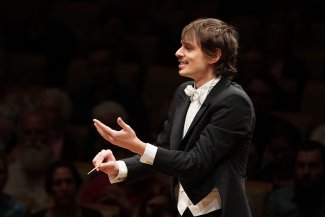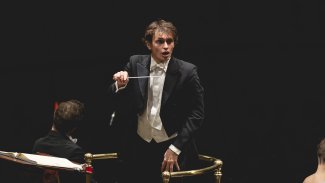



Eduardo Strausser
Download Assets
“The charismatic Strausser, sensitive and empathetic in accompaniment, achieved fine orchestral balance and clarity, the winds nicely positioned in the texture and the work well-pacedwith good forward impetus.”
The Five Lines, May 2023
Principal Conductor and Music Director Norrlandsoperan (from 2024/25)
In the 2024/25 season, Brazilian conductor Eduardo Strausser begins his first year as Principal Conductor and Music Director of Norrlandsoperan. The season features an extensive Nordic tour in November 2024 and the world premiere of Jenny Wilson’s debut opera, The Lovers, in March 2025.
Deepening his strong relationships with Antwerp Symphony Orchestra, summer 2024 sees Strausser’s first appearance at the Royal Concertgebouw Hall with the orchestra and soloist Yeol Eum Son.
Strausser continues his relationships with Ulster Orchestra, the Hallé, Royal Philharmonic Orchestra and Orchestre de Montpellier as well as debuts with Bilbao Orkestra Sinfonikoa , San Diego Symphony and Pacific Symphony. Other US engagements have included the symphony orchestras of Kansas City, Utah, North Carolina, Detroit and Indianapolis.
Show more
Working extensively across Australia, Strausser appears twice this season with Sydney and Queensland symphony orchestras, as well as debuts with Malaysian Philharmonic Orchestra and Adelaide Symphony Orchestra.
Previously Resident Conductor of Teatro Sao Paolo from 2014 – 2016, Eduardo has become an experienced opera conductor and productions in Sao Paolo have included Elektra and Carlos Gomes’ Fosca, as well as performances of The Nutcracker with Balé da Cidade de São Paulo and a Stefano Poda production of Mahler’s Symphony No.1. He is now based in Berlin but still returns home to Latin America for guest conducting.
Most recently he led Leonard Ever’s Die Odyssee for Zurich Opera and other highlights include Tosca for Northern Ireland Opera and Theater Magdeburg which he also conducted for Staastheater Hannover alongside productions including Il Barbiere di Siviglia, Hansel and Gretel and Die Zauberflöte. Elsewhere he has also conducted La bohème for Teatro Municipal do Rio de Janeiro and Teatro Verdi di Padova.
From a young age, Eduardo developed an interest in works by contemporary composers. Through his studies at the Zurich University of Arts, he worked with the visionary Karlheinz Stockhausen. Also as a student he took part in the International Forum for Conductors at the Ferienkurse für Neue Musik in Darmstadt, where he had the chance to work closely with composers György Kurtág and Brian Ferneyhough.
Eduardo works with top soloists, including Javier Perianes, Nobuyuki Tsujii, Alexandra Lowe, Isata Kanneh-Mason, Marie-Ange Nguci, Paul Lewis, Augustin Hadelich, Richard Galliano, Cédric Tiberghien and Steven Osborne among others. A multi-linguist, Eduardo speaks eight languages fluently including German, Italian, French, Spanish and Hebrew.
Contacts
worldwide general management
“The opening of this work was spine-tinglingly effective, showcasing WASO’s ever-impressive collective sense of drama as an ensemble, led most effectively by the flamboyant and impressively physical style of Brazilian conductor, Eduardo Strausser. Their creation of a long and gloriously rich crescendo, leading to a draw-droppingly virtuosic opening cadenza by Jumppanen, was everything that live classical performance should be.”
“In his ethereal, mercurial way, he seems to be part of the music itself, a kind of other-worldly creature, nimbly alighting from desk to desk, urging more from one, less from another. He was everywhere and nowhere at once, a conductor of the spirit.”
“Leading the fun was Brazilian Eduardo Strausser, who almost danced his way through the polkas and waltzes as he conducted from the podium with enthusiastic expression.”
“But the nicest compliment that needs to be made to the production: the scene enables the music to fly, we can hear how this wonderful score is so inspiring and playful. Eduardo Strausser conducts a lightly accentuated Rossini enriched with generous pianissimi. On the hammer piano, Francesco Greco lets the precisely worked recitatives sparkle with his improvisational free spirit. Great!”
“Everything is subject to the smooth sovereignty of the musical direction of Eduardo Strausser: he emphasizes all the details with the Staatsochester, so that brilliant accuracy goes hand in hand with an exhilarating zest for life. It didn’t take a minute for the audience to stand.”
“Strausser had the moment of his life, the best Jupiter Sinfonie in a long time!” ****
“Eduardo Strausser, a revelation of the season.”
“Maestro Strausser is unquestionably one of the new faces in the music world, and part of its exciting future”
“Eduardo Strausser holds a light direction, he’s sensible in choosing the timing and dynamics, attentive to the contrast of colors, very expressive. But, most importantly, the direction has a fast paced narrative rhythm and is pervaded by theatricality beauty, able to return to listening all the soft delicacy of Puccini’s score, without never incurring in languorousness.”
“The conductor Eduardo Strausser strikes, and the first three chords, solemn, threatening, sound different. Livelier, faster, or more intense. Immediately, everything … electrifies, pardon the pun. (…) Strausser conducts with precision, spirit, energy. The Orquestra Sinfônica Municipal responds magnificently.”
“A superb Strausser at Teatro la Fenice in Venice” — “The perfection of the Orchestra Filarmonica della Fenice shone in all its grace thanks to young conductor Eduardo Strausser … a real force of nature. His conducting is imbued with charisma, stage presence, and good chemistry with the orchestra …”
“On the podium, the young Brazilian conductor Eduardo Strausser [conducting the Orchestra Filarmonica della Fenice] proves himself a sensitive musician … Strausser has a beautiful gesture that translates into a very organic performance…”
“Young Eduardo Strausser, the theater’s resident conductor drew out playing that displayed the full spectrum of the Wagnerian instrumental palette, with an expressionist zest spurred on by an all-pervading sense of angst.”
“Everything changed on the second evening [this time under conductor Eduardo Strausser]. The orchestra seemed more confident, and Eduardo Strausser, lyrical and narrative, adjusting the intensity so as to bring out the voices, immediately captured the audience’s attention.”
”Eduardo Strausser brings youthful fire to the work (G. Verdi’s Otello) alongside vigilant attention to accuracy.”
”… the conductor expresses profound and passionate perception [of the opera Eugene Onegin], presenting the inner turmoil of the protagonists and the passions at stake.”













